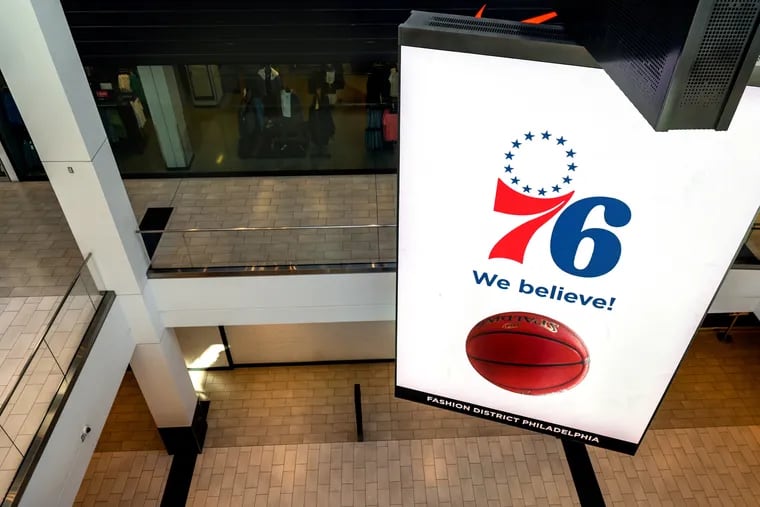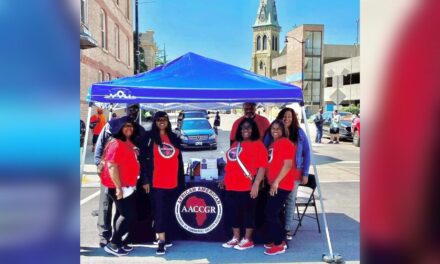/cloudfront-us-east-1.images.arcpublishing.com/pmn/7CYSOGN6IVAEPJGYDVQGWXNG5E.jpg)
The Washington Square West Civic Association has come out against the Sixers’ plan to build a Center City arena, the second of the two big, adjacent neighborhoods to oppose the project.
“We urge the City Council to vote NO,” the organization’s directing board wrote in a letter that was posted on social media Tuesday night.
The board’s stance aligns leafy Wash West, as the community is known, with the historic immigrant neighborhood of Chinatown, where large numbers have fought the Sixers’ proposal almost from the moment it was announced in July 2022.
The $1.55 billion arena and apartment tower would stand on Market Street East at 10th Street, between Chinatown to the north and Wash West to the south. Earlier this month the city’s Historical Commission designated Wash West as a historic district, the largest created in decades.
Civic board president Tami Sortman said the members closely read and discussed the findings of the city-sponsored analyses that were released in late August. They perceived that the studies showed “much more negative impact for our neighborhood and for Chinatown.”
She did not have the vote count at hand but said it was decisive.
The board’s decision comes a week after Philadelphia Mayor Cherelle L. Parker endorsed the controversial development in a video announcement as she met with Chinatown leaders at City Hall.
The mayor has scheduled a news conference for 5:30 p.m. Wednesday at the Convention Center, where’s she’s expected to discuss details of the agreement between her administration and the Sixers.
The project still must be approved by City Council, which could vote by the end of the year.
“We know there are people in opposition to this proposal, and it’s up to us once we get the legislation to look at it,” Councilmember Mark Squilla, whose 1st District includes Wash West, Chinatown, and the arena site, said Wednesday. “We know what a lot of their concerns are.”
A Sixers spokesperson has been asked for comment.
The civic association stated its opposition in a three-paragraph letter that gave no detailed explanation of its reasoning nor provided the tally of the board vote.
The organization cited the team’s proposal as presented to a city Civic Design Review board, the arena’s potential effects as described in city-sponsored impact studies, and its having heard many comments from neighborhood residents.
“The board does not believe it is in the best interest of the Washington Square West neighborhood,” the letter said.
People responded on the association’s Instagram page.
“Finally the courage to say something that we’ve all been asking for!” one person wrote.
“This doesn’t deserve the applause you think it does. Too soft a letter too many months late,” another commented.
Another said board members “want our neighborhood to be a glorified HOA frozen in time forever. Build the arena.”
The civic group’s long road to “No” includes a winter community ballot where 77% of respondents opposed the arena. Yet, in March, after months of inquiry and debate, the board opted to take no position on the project.
Some board members and residents questioned the validity of the voting, noting that 412 people responded in a neighborhood of 16,225 residents. Others insisted that the outcome was legitimate, determined as in every election by those who took the time to vote.
Chinatown residents say their neighborhood would be damaged by gentrification and displacement if the project goes forward on the western third of the Fashion District mall, atop of SEPTA’s Jefferson Station.
“To date not a single neighborhood association has backed this arena — and for good reason,” said Mohan Seshadri, executive director of the Asian Pacific Islander Political Alliance, a leader in the Save Chinatown Coalition. “This is a rushed process. … That’s why neighborhood orgs are standing together to urge Council to delay any legislation.”
On Tuesday the group No Arena Gayborhood announced that it would hold a news conference Thursday at City Hall before City Council meets to oppose the arena. It described the development as a danger to the neighborhood and the LGBTQ+ community it serves, “threatening to displace queer residents and businesses.”
The Sixers say the project will bring jobs, new business, and vitality to a Market Street East that has suffered for years and particularly in the aftermath of the COVID-19 pandemic.
The arena project has drawn support from labor unions and members of the Philadelphia business community, which hopes it can spark improvement on the beleaguered corridor. The Black Clergy of Philadelphia and Vicinity, the African American Chamber of Commerce of Pennsylvania, New Jersey and Delaware, and leaders and members of the building-trades unions also have come out strongly in favor.
On Sept. 18 Parker announced that her administration had reached an agreement with the Sixers to build the arena, which she said would bring new tax revenues and create hundreds of new jobs. She called the project “the start of an unprecedented revival” of Market Street East.
“This is a historic agreement,” the mayor said in the video. “It is the best financial deal ever entered into by a Philadelphia mayor for a local sports arena. I wholeheartedly believe it is the right deal for the people of Philadelphia.”


